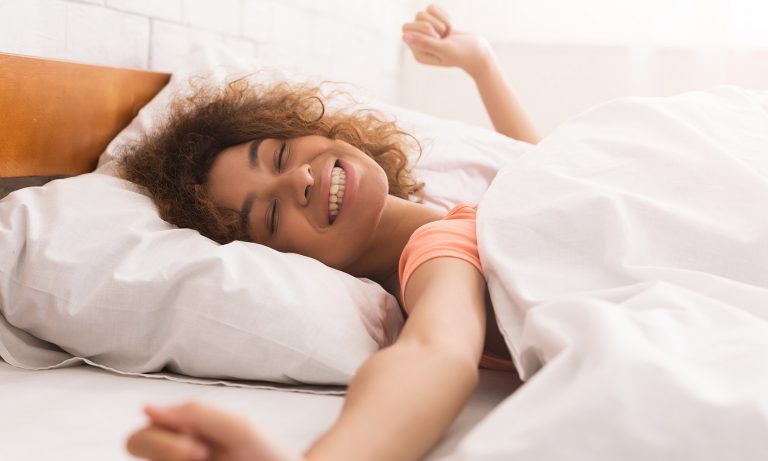
Did you know that 35% of Americans are sleep deprived?! You can eat well, exercise, do bodywork, pray/meditate but if you are not sleeping, it’s all for naught. Quality sleep is absolutely integral to good health. It’s when our bodies recover, rest and rejuvenate. And if you’re one to say, “I can get by on 3/4/5 hours of sleep,” I beg to differ. While you may feel you have energy, what is that level of sleep deprivation doing to your immune system, your mental clarity, your physical and mental performance?
Poor sleep is correlated with obesity, diabetes, cardiovascular disease and hypertension. We are discovering more and more benefits of sleep all the time. A 2019 study published in Science showed that cerebrospinal fluid, also called CSF (the fluid that surrounds your brain and spinal cord) gets flushed during sleep, clearing your brain of metabolic waste. The CSF synchronizes with your brain waves and clears toxic substances, potentially offsetting “normal” aging, dementia and Alzheimers.
So what if you’re trying to sleep, but can’t?? The reasons for poor sleep are as varied as those for general fatigue or for headaches, but here are some checklists that are good places to start when trying to improve your sleep. On a personal note, I started struggling with sleep last year – all of a sudden and rather intensely. What I can tell you from my experience helping myself and others is that everyone is unique. These recommendations are listed in order of things to try, from simple tips to more complex. Questions – reach out! I’m happy to help you navigate.
Sleep Basics
- Avoid screens of all kinds 2-3 hours before bed. The non-native “junk” blue light that dominates screens keeps our eyes working (think of an aperture on a camera constantly trying to adjust to the light) even when we think we’re winding down by reading or relaxing. This is also true of LED or fluorescent lighting; it keeps our eyes “on” (and can be the cause behind fatigue and headaches as well). Go with warm, natural lighting and incandescent bulbs when possible.
- Biohack: turn your phone red in the evening
- Biohack: use blue blocking lenses like these from Blublox. I also love their eye mask for meditating.
- Basic bedroom hygiene:
- No screens in the bedroom! This one bears repeating. If you are “sleeping” with the TV on, I can guarantee you you’re not getting great shut eye.
- Keep it cool. Research shows 60-68 degrees is the magic thermostat range. This promotes deeper sleep, encourages melatonin and HGH production, encourages anti-aging properties, and more. Read more here.
- Keep it dark. Blackout curtains, cover any LED lights, wear a mask. Your body’s natural melatonin production requires darkness.
- Workout
- No matter how mentally taxing your job is, if you are not moving and exhausting your body, your sleep will be compromised. Morning is best, but be sure to do it minimally 3 hours before bed.
- Avoid caffeine after 12pm
- Caffeine before noon is medicine, after noon is poison. Limit total consumption to 4 cups a day.
- Monitor what you eat and drink
- Don’t go to bed hungry or stuffed. *THIS INCLUDES INTERMITTENT FASTING* – more on this in a moment. I believe this partially triggered my own sleep issues. DO eat meals at least 2-3 hours before sleeping.
- Watch your EMF
- Symptoms of EMF sensitivity are typically mental fog, headaches and insomnia. They are worse in bigger cities and tend to improve in the country. Whether you’re EMF sensitive or not, however, we’re all sensitive to the electric frequencies around us, and historically when a new frequency has been introduced (radar, radio, even solar flares) there have been widespread health repercussions.
- Audit your home and particularly your sleep environment –
- Turn off your WIFI at night. There are automatic timers for this as well.
- Keep your phones/devices out of the bedroom. Minimally turn them on airplane mode. Unpopular, but helpful.
- Cover your Smartmeter. I did this last year when I realized mine was directly downstairs from my bed. Here’s the one I got.
- Be mindful of the number of smart devices in your home. New fridges, washer/dryers, thermostats like Nest, doorbell/cameras, speakers like Sonos all will contribute to EMF smog in your home.
- Do your best and then let it go. The EMF rabbithole is a long one, and to fully mitigate it you’d have to have testing from a building biologist who would assess how your home is wired (dirty electricity is no good) and what grids it falls in. You’d probably rewire then repaint your home with special EMF blocking paint and essentially sleep in a Faraday cage. I’m all for maximizing your health, but being too mentally consumed with it is equally as toxic.
Next Level Sleep Hacks
Doing all the above and sleep struggling with sleep? I hear you and I feel you. Here are some good places to start with supplementation.
- Melatonin – melatonin is a powerful anti-oxidant and gets a bad wrap, IMO. Yes, if you take it every day you will build a bit of a tolerance, but it’s still a good place to start IF your problem is falling asleep. Start with 3mg and work up if required.
- 5- HTP -if your issue is staying asleep, this is where I like to start. It mitigates serotonin, which is largely responsible for people staying asleep.
- Insomnitol – and synergistic products like it. From Designs for Health, this contains 5 HTP, melatonin, L-theanine, 5HTP, B6.
- Versea CBD Spray – and yes, I’m specific here. You need a heavy duty dose of CBD to affect sleep. 70% of CBD products do not contain what they say they contain, and I’d guess 95% of them are simply not dosed strong enough to impact sleep or pain. This water based, through clinician only product is 4.4x more absorbable than an oil or tincture, is reasonably priced and is in stock in office. PLEASE do not buy CBD at a gas station, head shop, big box store or online. More on my CBD recs here.
- Magnesium – this is a good “go along” for all of the above. Eighty percent of people are deficient in Mg and it has positive effects on mood, muscle function, performance recovery and more. I like Calm a few hours before bed.
- Herbs – at one point, I was taking $300/month of herbs for sleep. A lot of these build slowly, but can be quite effective. I ONLY recommend herbs from Mediherb (Standard Process herb line) which have tons of third party testing and quality control. I can’t overemphasize that you do NOT want low quality or poorly sourced herbs. My favorite is Valerian Complex, but have also seen results with Kava Forte and still regularly drink Bedtime from Yogi Tea, which is passionflower and jujube based.
- Foods – Almonds, turkey, walnuts (more here). I’d love to say I’ve seen this work, but maybe you’ll be the first!
- Use a wearable like Oura ring or Whoop to monitor your sleep and see what certain supplements do. Warning: both of these have a possible “nocebo” effect, meaning you may feel fine but then a bad “readiness” or “recovery” score can send you into a mental spiral. Additionally, if you got a bad night’s sleep, what help is it to read the details of your bad night’s sleep? Use the info but don’t obsess about it.
Cool, I still can’t sleep
I hear you. I feel you. It’s frustrating. Here are some good next steps.
- Let’s look at your adrenals and thyroid. I like full panel blood testing for thyroid. For adrenals, I like saliva testing through Diagnostechs, which measures your cortisol throughout the day. Ideally, it should rise upon waking, peak and then slowly lessen throughout the day. Once we can see what’s happening (maybe divebombing in the midafternoon? spiking at night? that’s why we test, don’t guess) we can treat appropriately.
- Adrenal fatigue often looks like this: super high functioning for a couple years and then a crash. No energy, no restful sleep, feeling taxed all. the. time.
- I love to catch thyroid dysfunction before it’s considered medically dysfunctional. We can do a lot before rx treatment! I see a lot of women go onto thyroid meds and I don’t think I’ve ever seen one come off of them.
- Let’s look at your hormones. If you’re a cycling woman, we may even start here and combine with the adrenals. I love the DUTCH test, which is a dried urine test that gives us a full picture of your hormones throughout the month. Your insurance might cover a blood draw, but IMO this is almost always worthless. It’s a snapshot in time, of what’s floating in your blood (not what’s making it into your tissues, and gives us zero perspective of what happens throughout the month. Same deal with adrenal testing).
- A note on intermittent fasting: ALL of the research on intermittent fasting has been done on men, who have the same 24 hour hormone cycle. In cycling women, hormones change from day to day and week to week. Because of this, women should not intermittent fast at all during their cycle, and should only do so every other day during other times of the month. Uninterrupted IF WILL impact your hormones, it’s just a matter of when. And when your hormones are off, so is your sleep.
- Let’s even look at your gut. Ninety five percent (!!!) of your serotonin is made in your gut lining, so if you have leaky gut (which we now know that Covid-19 triggers), autoimmune issues or tummy woes, you will not sleep well or have a great mood. For more on the value of a stool test, click here
To access any of the supplement links above, please create a Fullscript account. Order from your couch and receive to your doorstep.
To schedule any of the testing listed above, click here, then my image and select “Functional Medicine Initial Appointments.” For a telehealth appointment, select “Functional Medicine Initial Appointments VIDEO.”
I’m here for you!




